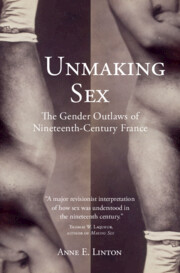‘Unmaking Sex is an impeccably researched and original study of the intersex phenomenon in medical and literary discourses of nineteenth-century France. Through expert synthesis of archival research into over 200 medical cases, Linton provides a cultural prehistory to today's widely-debated topic of gender boundaries. This truly interdisciplinary project succeeds in reconstructing a vast and complex network of myth, medicine, anatomy, and rhetoric in relation to the binary-unsettling realities of indeterminate sex. It will become a must-read for serious scholars of gender and the nineteenth century.'
Andrea Goulet - University of Pennsylvania
‘Anne E. Linton has opened up medical archives to telling effect, finding many a pathetic case become tragic in medical treatment. But her deeper commitment lies in showing us that the novelists, however limited by conventions, generally were out in front of the doctors in exploring the delicate terrain of intersex – hermaphrodism in 19th- century parlance. It's the novelists who were groping toward understanding the limits to binary thinking about gender and sex. The result is a book of high interest.'
Peter Brooks - Yale University
‘Linton's truly original achievement is to have repositioned nineteenth-century French culture, in its archival breadth as well as in the depth of its literary close readings, within a new critical space. This space is located in the vital tension between Foucault's history of sexuality and contemporary transgender criticism which underpins questions of identity in our own age.'
Nick White - University of Cambridge
‘This very smart book examines a wide range of accounts of those who defied the gender binary in nineteenth-century France. By combining literary and medical histories, Unmaking Sex offers an expansive and dynamic view of the centrality of debates over sexual difference and gender boundaries in nearly every sphere of life. The book challenges longstanding views of the emergence and acceptance of the concept of ‘true sex.' An important and fascinating read!'
Jen Manion - Amherst College
‘In Unmaking Sex, Anne E. Linton shines expert light on the enormous commotion – epistemological, medical, legal, narrative – occasioned by ambiguously sexed bodies in nineteenth-century France. Her analysis, at once scholarly and humane, gives a more detailed picture of the lives of intersex people in this period than we have ever had before, and offers a new understanding of the importance of ambiguous sex as a concept in post-revolutionary France – unmaking along the way a number of received scholarly hypotheses about how the nineteenth century understood sex. A must-read for all scholars of French history and culture, as for all historians of gender and sexuality.'
Andrew Counter - New College, University of Oxford
'Anne E. Linton has written the first account of a growing fascination with gender-ambiguous embodiment in nineteenth-century France. Literary and scientific texts on what was then called 'hermaphroditism' made sex and gender ambiguity into mysteries to be solved. Linton investigates this widespread interest and comes up with a truly compelling history of gender and sexuality.'
Jack Halberstam - author of Female Masculinity and Trans*
'Linton offers massive and largely new archival evidence for the struggles of nineteenth-century doctors to determine ‘true sex’ in ambiguous cases, which she mobilizes to offer brilliant readings of a wide range of canonical and little-known fiction. This book is a model of historically grounded literary criticism and a major revisionist interpretation of how sex was understood in the nineteenth century. Foucault was not quite right about the famous Herculine Barbin case; and Making Sex was not quite what I thought it was.'
Thomas W. Laqueur - Helen Fawcett Distinguished Professor of History (University of California, Berkeley)
‘This monograph will be of particular interest to scholars of nineteenth century literature, medicine, history, sexuality, and gender, as well as graduate students in a wide array of disciplines. Unmaking Sex is a thoroughly researched, detailed, and original contribution that leaves its reader with a nuanced understanding of intersex in the French nineteenth century.’
Erica Schauer
Source: Nineteenth-Century French Studies
‘Anne E. Linton’s impeccably researched book explores the history of intersex in nineteenth-century France through an exhaustive examination of both medicine and literature. Her work makes an essential contribution to the history of sexuality and demonstrates the important role of nineteenth-century French fictions therein.’
Rachel Mesch
Source: French Studies
‘The archival research Linton has undertaken is massive, bringing to light over 200 newly uncovered case studies of gender ambiguous people from 1800 to 1920. She also analyzes how long-forgotten popular fiction influenced several well-known texts, allowing Linton to propose fresh readings of famous authors like Balzac, Gautier, and Zola.’
Céline Brossillon
Source: The French Review
‘… beautifully written and artfully structured. It is also a vitally important work … Linton reveals that gender outlaws are nothing new and that sex and gender binaries are unstable, precarious constructions.’
Sarah Horowitz
Source: H-France
‘[An] important history of intersex that presents a new interpretation of nineteenth-century conceptualizations of gender and sex. … This volume should find a broad readership among scholars of nineteenth-century France, gender, sexuality, and medicine. It is relatively slim and therefore will make for an excellent addition to advanced undergraduate courses in these fields. … ‘Unmaking Sex’ certainly deserves its place in this emerging canon of histories that challenge the gender binary.’
Andrew Israel Ross
Source: Journal of Modern History



